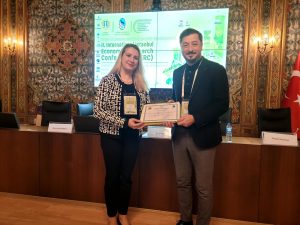Today, environmental sustainability is a top priority for businesses and society. Problems such as depletion of natural resources, climate change and environmental pollution attract the attention of both governments and the private sector. In this context, green independent audit practices play a critical role in assessing the environmental performance and sustainability strategies of businesses.
What is a Green Independent Audit?
A green independent audit is a type of audit that assesses and reports on an organization’s environmental responsibilities and sustainability performance. These audits assess and report on an organization’s environmental impact, use of natural resources, energy consumption and waste management.
nspects and assesses its compliance with sustainability standards.
Why is it Important?
Legal Compliance: Environmental protection laws and regulations are becoming increasingly stringent. Green independent auditing prevents potential legal problems by ensuring that businesses comply with these laws.
Competitive Advantage: Sustainability has become an important factor in consumer preferences. Green audit reports document the environmentally friendly practices of businesses and create a positive image in the eyes of customers and investors.
Risk Management: Environmental risks can cause financial and reputational damages for businesses. Green audits help identify and manage these risks.
The EU Green Deal and What It Means for Business
The European Union’s Green Deal is a comprehensive initiative to prepare Europe for a carbon neutral continent by 2050. This
wide-ranging issues such as consensus, sustainable energy use, circular economy, biodiversity and consumption reduction.
Contains policies and regulations. The EU Green Deal provides a set of playable and opportunities for activities that demonstrate activity across the spectrum of members.
offers:
Carbon Footprint Reduction: Various measures need to be taken for businesses to reduce their carbon footprint. This is energy revenues
This includes steps such as increasing energy consumption, complementing replaceable energy sources, and optimizing waste management.
Circular Economy: Adopting circular economies to extend the life of products and extend the range of resources
is encouraged. This allows them to minimize source narration of information and increase their recovery.
Transparency and Reporting: The EU Green Deal calls for more transparency about their performance rather than their performance. This,
It means storing the contents of sustainability reports and making them publicly available.
Green Audit Process
Planning: The audit process is planned taking into account the field of activity and the effects of the demonstrations.
EU Green Deal requirements are also taken into account at this stage.
1.Data Collection and Analysis: It is based on the performance data of the business and analyzed. In this process, energy consumption, water use, waste
Transferring data such as production. In addition, the level of compliance with EU regulations is also examined.
2.Evaluation and Reporting: Data collected, storage and a report according to sustainability and the EU Green Deal
prepare. This report provides detailed information about performance performance and includes their recommendations.
3.
Iqdenetim and Green Independent Audit
As iqdenetim, we support them in their sustainability journey with green independent audit activities. EU Green
Evaluate, report and evaluate marketing performance in accordance with the Consensus and other international standards.
We offer summary support on development. In our inspections, we aim to minimize the problems in the pores and
helps you achieve sustainability equipment.
Businesses need to improve their sustainability performance, not only by being consolidated, but also by ensuring their legal compliance.
It also helps maintain competitive advantage. As iqdenetim, we provide green independent auditing services in this process.
It guides them and enables them to fulfill their activity responsibilities regarding developments.
**Green Deal Reporting Tools**
The EU Green Deal includes a series of regulations that require businesses to report on their environmental and sustainability performance. This reporting ensures that companies transparently disclose the environmental impacts of their activities. In this process, businesses can utilize various reporting standards, tools, and frameworks. Here are some commonly used reporting tools to comply with the Green Deal:
1. Global Reporting Initiative (GRI) Standards
GRI Standards are the most widely used sustainability reporting framework globally. These standards enable businesses to report on their economic, environmental, and social impacts. GRI provides sustainability performance indicators that help companies measure and report their environmental impacts.
2. Carbon Disclosure Project (CDP)
CDP is a platform that allows companies to report environmental information such as carbon emissions, water usage, and forest resources. Through CDP, companies can assess and report their carbon footprints and climate change risks. This platform is an essential tool for providing transparency to investors and other stakeholders.
3. Sustainability Accounting Standards Board (SASB)
SASB is an organization that develops industry-specific sustainability accounting standards. These standards allow companies to provide information on sustainability issues that, while non-financial, are important to investors. SASB standards are suitable for businesses looking to integrate environmental, social, and governance (ESG) performance with financial reports.
4. Task Force on Climate-related Financial Disclosures (TCFD)
TCFD is an initiative that promotes the disclosure of climate-related financial information. The TCFD framework guides companies in evaluating their climate change-related risks and opportunities and disclosing this information in their financial reports. This framework helps investors assess companies’ resilience to climate risks.
5. Integrated Reporting
Integrated Reporting encourages companies to combine financial and non-financial information in their reports. This reporting format offers a comprehensive perspective on the value created, resources used, and long-term strategic goals of the company. It provides a more holistic report by integrating sustainability and financial performance.
6. ISO 14001 Environmental Management System
ISO 14001 provides a framework for companies to manage and continuously improve their environmental performance. This standard requires the establishment, implementation, and improvement of a management system for managing environmental impacts. ISO 14001 certification also serves as a tool for companies to formally demonstrate their environmental responsibilities.






